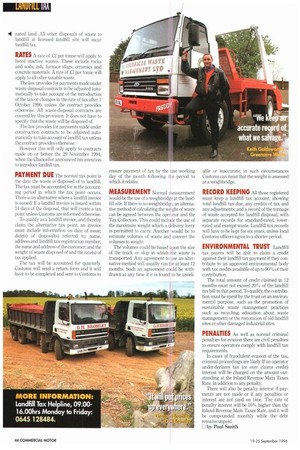RATES A rate of ,C2 per tonne will apply to
Page 46

If you've noticed an error in this article please click here to report it so we can fix it.
listed inactive wastes. These include rocks and soils, ash, furnace slags, ceramics and concrete materials. A rate of £7 per tonne will apply to all other taxable waste.
The law provides for payments made under waste disposal contracts to be adjusted automatically to take account of the introduction of the tax or changes in the rate of tax after 1 October 1996, unless the contract provides otherwise. All waste-disposal contracts are covered by this provision. It does not have to specify that the waste will be disposed of.
The law provides for payments made under construction contracts to be adjusted automatically to take account of landfill tax unless the contract provides otherwise.
However this will only apply to contracts made on or before the 29 November 1994, when the chancellor announced his intention to introduce landfill tax.
PAYMENT DUE The normal tax point is the date the waste is disposed of to landfill. The tax must be accounted for in the accounting period in which the tax point occurs. There is an alternative where a landfill invoice is issued. If a landfill invoice is issued within 14 days of the disposal, that will create a tax point unless Customs are informed otherwise.
To qualify as a landfill invoice, and thereby claim the alternative tax point, an invoice must include information on date of issue; date(s) of disposal(s) referred to: name, address and landfill tax registration number; the name and address of the customer; and the weight of waste disposed of and the rate(s) of tax applied.
The tax will be accounted for quarterly. Customs will send a return form and it will have to be completed and sent to Customs to ensure payment of tax by the last working day of the month following the period to which it relates.
MEASUREMENT Normal measurement would be the use of a weighbridge at the landfill site. If there is no weighbridge, an alternative method of calculating the weight of waste can be agreed between the operator and the Tax Collectors. This could include the use of the maximum weight which a delivery lorry is permitted to carry. Another would be to estimate volumes of waste and convert the volumes to weight.
The volumes could be based upon the size of the truck or skip in which the waste is transported. Any agreement to use an alternative method will usually run for at least 12 months. Such an agreement could be withdrawn at any time if it is found io he unreli able or inaccurate; in such circumstances Customs can insist that the weight is assessed at a weighbridge.
RECORD KEEPING All those registered must keep a landfill tax account, showing total landfill tax due, any credits of tax and any adjustments; and a record of the tonnage of waste accepted for landfill disposal, with separate records for standard-rated, lowerrated and exempt waste. Landfill tax records will have to be kept for six years, unless local Customs officers agree to a shorter period.
ENVIRONMENTAL TRUST Landfill tax payers will be able to claim a credit against their landfill tax payment if they contribute to an approved environmental body with tax credits available of up to 90% of their contribution.
The total amount of credit claimed in 12 months must not exceed 20% of the landfill tax hill in that period. To qualify, the contribution must be spent by the trust on an environmental purpose, such as the promotion of sustainable waste management practices such as recycling; education about waste management; or the restoration of old landfill sites or other damaged industrial sites.
PENALTIES As well as normal criminal penalties for evasion there are civil penalties to ensure operators comply with landfill tax requirements.
In cases of fraudulent evasion of the tax, criminal proceedings are likely. If an operator under-declares tax (or over claims credit) interest will be charged on the amount outstanding at the Inland Revenue Main Taxes Rate, in addition to any penalty.
There will also be penalty interest if payments are not made or if any penalties or interest are not paid on time. The rate of penalty interest will be 10% higher than the Inland Revenue Main Taxes Rate, and it will be compounded monthly while the debt remains unpaid.
El by Paul Smith








































































































